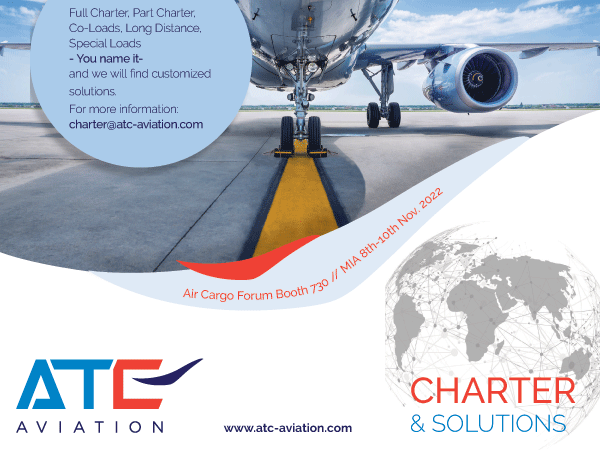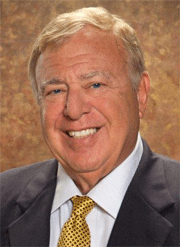
 |
| |
 |
 #INTHEAIREVERYWHERE |
| Vol. 21 No. 43 | Wednesday
November 9,
2022 |
| |
 |
For Canada and Yellowknife, Northwest Territories-based Buffalo Airways Cargo folks, attending The International Air Cargo Association TIACA Air Cargo Forum to rub elbows is only right. Somewhere in the heart of every one of those age-defying aircraft still in use, speaks of air cargo’s glorious past and endless possibilities! Now Buffalo Airways, the 50-year old company from a place so far north on the map of the Americas that by the time you arrive there you are almost heading South, bought a B737-300SF, that joins an unexpected fleet of World War II-era Douglas DC-3s, C-46s, and a variety of other turboprop aircraft. Buffalo from Yellowknife keeps busy, among other things supplying all manner of air cargo services including basic supplies from soup to nuts to settlements all over Northern Canada. Secondly, but maybe even firstly as I think about it, every time you hear the throaty growl of a 13,000 pound lifting C-46 or get to push back in a Buffalo DC-3, it only feels right that somebody should be doing air cargo reporting with Ink and Av Gas, so let me try and tell you all about it. Buffalo Airways’ general manager, Mikey McBryan, said, adding a B737 to the fleet makes sense to meet increased customer demand for next-day freight delivery. The 737 is currently going through the Canadian Import process and will be flying very soon. “Our C-46 cargo aircraft are maxed out daily, so a larger aircraft was needed,” explained McBryan. “Going with an ATR-72 Freighter on this route wouldn’t add much more capacity, so the next step up is the 737. “The company has contracts with FedEx, UPS, and DHL, among others, that require next-day service. Moreover, McBryan said Buffalo’s biggest customer “is actually ourselves.” He added: “Our courier company, Buffalo Air Express, accounts for 60 to 75 percent of our nightly cargo volume.” The Buffalo B737 (when authorized for service) will operate Monday through Friday (for overnight freight) from Edmonton International Airport (YEG), to Yellowknife Airport (YZF), and back to YEG. “That will leave the 737 in YEG for the rest of the day to be open for ad-hoc work,” said McBryan, “and for other cargo operators and customers to hire us for scheduled cargo routes.” Mikey added. Heads up maybe B737 set to be the darling? . . . Boeing just forecast that demand for air cargo will more than double by 2041, with traffic tripling and the world's freighter fleet rising by more than 60%. Boeing said the world's cargo fleet will require nearly 2,800 production and converted freighters for growth and replacement through the period. With cargo traffic doubling, operators will need to switch to more capable, fuel-efficient and sustainable jets. A third of deliveries will consist of new production freighters, whilst the remaining two-thirds will be freighter conversions. Contact: Buffalo Airways–Courier and Cargo T: 867-873-2084, F: 867-873-3484 Email: cargo@buffaloairways.com |
Taking an idea into reality and then bringing it out to the world has always been uppermost on the mind of Amar More, the CEO of Kale Logistics. This is the Mumbai-based company that revolutionized the air cargo process by implementing the Kale Exclusive Cargo Community System for smaller and bigger trucks calling daily at Atlanta Airport in 2019. FT is accustomed to meeting many friends who are also busy personalities, often flying to far away destinations in their business programs. Here is a man though, who lifts the definition of the word busy to a higher level. Since Atlanta went into business with Kale, Amar moved his wife and children lock, stock and barrel to Atlanta, Georgia and went totally hands on to this plan as Atlanta Airport changed the air cargo management at that gateway forever. It turns out that approach has accelerated the system development; elsewhere folks are waking up to a new day in managing air cargo traffic flow meanwhile the Kale solution is moving to other cargo hubs as you read this article. FT had the opportunity to interview Amar More on the run in between flights, what else? FT: Please share what you have learned about navigating through crises during the past COVID years? AM: COVID taught us survival and patience. We learnt so much about hygiene, leaving in confinement, respecting life and being thankful for being there. I also understood and appreciated that real heroes risked their lives and kept working to keep us all safe. As they say, with every adversity comes an opportunity: COVID helped global logistics in adopting new technology at a rate otherwise unthinkable. During the pandemic, our cloud-based solutions and community platforms promoted contactless operations, work-from-home models and paperless processes to keep the industry safe and going. FT: How do you imagine ocean carriers buying into airlines might impact air cargo business? AM: It will only get more competitive. Ocean carriers, aggregators and 3PL players are taking on air cargo as they want to develop end-to-end global supply chain operations. Being able to ship or fly goods helps shipping carriers to create a one-stop-shop for cargo. This is a strategic move to provide a suite of services and expand the business area with customers. With increased volatility in freight rates, the airlines need to create a moat around their business to keep their “fortress” safe. Overall ocean carriers buying air carriers will be good for air cargo: we can see a salutary impact on the air industry with some modal shift, but to better compete in the long term, airlines need to reposition themselves as premium operators specialising in high-value or perishable goods, such as flowers. FT: Likewise, what long-term changes are foreseen as the result of COVID-19? For the better? For the worse and should be avoided? AM: The long-term changes that we anticipate will embrace these areas: Focus on Sustainability: Shippers are becoming more environmentally conscious and are being held accountable for their emissions by their customers. Many are now reporting their SC-related emissions and are looking for carbon-neutral options. We all need to meet customers’ expectations for the highest standards of sustainability, but going from stabilizing to reducing emissions will require a collective effort. Modernization: The pandemic accelerated digitization as it introduced contactless processes to reduce the risk. We need to build on this momentum, not only to increase operational efficiency, but to meet customers’ needs. The biggest growth areas are cross-border e-commerce and special items like time and temperature-sensitive payloads. These customers want to know where their items are, and in which condition, at all times during transport. That requires the digitization and capture of all data. Safety: Cargo and people Safety is the buzzword in today’s Air Cargo circles. Misdeclared shipments, risk exposed front-line staff, lack of cargo tracking at the airport, theft and cyber-attacks are holding the centre stage. The industry needs to brace up to these challenges. Many Airlines and Airports have robust systems to address common hacking threats, but often fail to take a holistic approach to the entire IT environment. Trade Facilitation: Trends like anti-protectionism, vaccine rational distribution, World Trade Organization’s Trade Facilitation Agreement’s (TFA) ratification, e-freight, etc. are building considerable pressure on nations and the Air Cargo industry to develop frameworks, mandates and guidelines to comply with these global facilitation initiatives.
FT: What deliverables are expected at the trade shows Kale Logistics attends? AM: Trade shows are one of the most efficient ways to meet existing customers and prospects. Add to that learning from the experts on the latest happenings in the industry. At this year’s shows, we hoped that the industry turn-out was massive, and we were looking at creating awareness about our Cargo Community Systems in the industry. This is part of our strategy. Our team of experts are showcasing our pioneering platforms, showing a way to make the entire supply chain more efficient and transparent. We are also looking to learn from the industry through collaborations and joint initiatives. FT: Report card on Kale Launches during COVID? Can you offer an overview of reaction to your effort? What is next? How can others including business partners and even perhaps competitors join in the Kale Logistics initiative? AM: We were proactive in the pandemic situation, as we quickly rolled out low-investment point solutions for the Logistics industry with free Proofs-of-Concept. This was designed to support the industry, which was facing a crisis. Our persistent role helped us penetrate markets which were earlier difficult to enter. We had great success with the North American market, signing up and working with Atlanta, New York, Boston, Philadelphia, Chicago Rockford, Vancouver and two other airports that are protected by a non-disclosure agreement. We have also signed up with a maritime port in North America and globally with over 50 airports and ports to create digital communities. We then plan to connect these communities using digital corridors to create an unparalleled digital infrastructure for logistics globally. Cargo Community Systems are not an end in themselves: they need to constantly grow and evolve according to changing customer needs, with collaboration among industry peers with their applications, not conflicting, but adding value to the supply chain. Disruptive technologies like Blockchain, AI, Machine Learning, Robotics, Augmented Reality, Virtual Reality, Data Hubs, and Geo-Spatial will find a way to the CCS. We have the bold vision of connecting the global logistics industry through technology to facilitate the global trade. This is not going to happen without partnerships, not just with our partners with complementary offerings, but also partnerships with competitors. If we all work together we shall create the everlasting global digital infrastructure that this industry has deserved for a long time. FT: Can you offer some highlights of programs and services that lie ahead in 2023 and beyond? AM: When we started off this year, we were sure the industry would rebound from the dire straits of COVID, and tech adoption would continue to gain more ground. We were right. There is more demand for cloud-based and SaaS-based solutions. We are focused on digitizing more Airports and Ports this year. We have already touched 100+ Air Cargo Stations and are talking to 40 more Airports and Ports at this point in time. A cargo community system comes with some limitations, as it has geographical boundaries. To overcome these and achieve larger synergies globally, one has to think beyond Cargo Community Systems. This brings us to the future of Cargo Community Systems, i.e. the Digital Trade Corridor. The Digital Air Freight Corridor aims to create a completely transparent supply chain through the exchange of real-time shipment status information between airports by exchanging shipment data to eliminate duplicate processes. For example, we can share shipment arrival information in advance with the rightful stakeholders in the destination Airport so that the Customs, Handlers, and other stakeholders are well informed and prepared to handle the incoming freight on time. We have established the first Digital Air Freight Corridor between India and the Netherlands, powered by Blockchain. Another remarkable offering is the e-Marketplace, an online portal for booking door-to-door cargo transportation services, offering competitive pricing and total transparency of the best shipment options across all modes of transport. The platform connects supply chain stakeholders, such as freight forwarders, Customs brokers, shipping lines, airlines, transporters, consignees, warehouse operators, rail operators and regulatory authorities, enabling them to adopt modern logistics practices that will allow better response to customer demand, increased efficiency and a more competitive industry landscape in the Air Cargo space. The platform can connect with third-party systems, Cargo Community Systems and systems of the Airport Authority and terminal operators to provide status updates. I am particularly proud of this achievement, which is contributing to the construction of a seamless and transparent air cargo supply chain, de-facto an unparalleled enhancement of service levels. We have also introduced the Maritime Single Window, which is now a mandate from the International Maritime Organisation (IMO) to be implemented in all ports before Jan 2024. In this light, we are working closely with global bodies to give impetus to digital policies and initiatives. FT: You had been planning for the World Cargo Symposium in London. What was your expectation? What would have been your message to your colleagues? AM: Sadly I was stuck at home by circumstances that I could not help. I was hoping to see friends from the industry in London. The sessions are always important, but even more important are meetings with customers and prospective customers that are possible in such a vast gathering. Despite the obvious precautions, face-to-face meetings can still be very productive. This and other events are solid ground for companies like us to promote digitization and create awareness on sustainability through paperless operations in Air Cargo. Our message is loud and clear: digitization with Cargo Community Systems is critical to change the way cargo is handled, forever and for the better. The industry needs to adopt digitization for growth. Technology is no longer purely good to have, but it is now a must-have. I am now looking forward to TIACA ACF in Miami where my team and I will be available at Stand 531. FT: How do you rate cooperation amongst all the forces today? What needs to be emphasized, improved or needs to be changed? How can Kale drive that initiative? AM: At Kale collaboration is our overarching vision to provide technology to the logistics industry. We want to convert the cacophony in the supply chain to a melody through digital collaboration. We can hear the rumble and see the change coming. People are more open to connect their systems than they ever were before. There is great synergy and cooperation amongst the industry players toward Digital Transformation. It is crucial for all of us to understand that we just cannot continue working as we did in the past, with cargo idling on the ground for up to 85% of the total transportation time. The average Air Cargo transit time has hardly moved in the last 30-35 years, an average Air Cargo shipment still generates over 100 paper copies of some 30 different documents. Our community platforms have the potential to save around $50 bn. annually in terms of efficiencies and 10 bn. paper copies (across air/sea modes), which corresponds to saving 625,000 trees annually. The technology is right here, available for the airports and ports. All that is needed is the right leadership, with intent. We can no longer just pay lip service to the environmental and economic sustainability issues and play the waiting game (for someone else to do something before we start). We believe that the Airports or communities that will initiate early will reap the maximum benefits and attract more cargo than others. So, we believe the time to act is now, and we are there to hold hands throughout the digital transformation journey. FT: How did your family make it through the pandemic? Can you share how your fine family and other changes to the More norm may have impacted your life? AM: My family indeed surprised me with their adaptation skills during the pandemic. First and foremost, they had to get used to seeing me in the house? I had been traveling all these years and rarely spent 50% of the total time at home and here I was completely stuck at home during the long pandemic period. I had thought it would be impossible to keep kids home, given the fact that every day we had to drag them back home from the play area in our colony in India. But I think they did remarkably well in adjusting to this change. Their schools moved online and they managed that well too. We got to spend time at home and spent time as a family playing indoor games which I had never imagined I would be able to do. My parents also had to move onto the digital bandwagon for their meetings with their friends and other social interactions. And finally my wife: she, like most women, is a superhuman. She helped us transition so unbelievably well that life was never boring during the pandemic. We also moved from India to the U.S. in the same period and that was another big change for us. All in all the pandemic really meant some significant “shifts” for the More family. GDA/MS |
More From Kale
Logistics Solutions |
 |
Day One of The International Air Cargo Association ACF in Miami Beach and the rain from the big storm began. Day Two is supposed to speeding up 25-50 mph winds, but know thankfully Miami is not in the direct path nor appears at this point to not be on “'the dirty side of the storm’. Attendance is busy. It appears that people travelling from overseas are here at ACF and cancellations were minimal, mostly amongst people from this hemisphere. Airlines were offering cancellations with full refunds . . . We are delighted to have learned of ATC South America’s meeting with the INSALCO - Instituto Superior Alemán de Comercio instructing companies. It shows ATC Aviation Services South America' commitment to support young talented students. ATC South America and Germany are at Air Cargo Forum in Booth 730. Drop by and learn of the ATC commitment to support young talented students through a dual education system, and learn about the great evolution of intern student Juan Manuel Fröhlich in the company. |
Separating
Wheat From Chaff What Happens Next? TIACA
ACF opens today in Miami. TIACA
ACF opens today in Miami.So once again thinking and in some cases sharing big thoughts brings the promise and planning ahead for next year. But what is the big picture? Here is someone who has some ideas. "There is no doubt air cargo is in a time of definite change post pandemic," William Boesch 'Bill' Chairman of Cargo Logistics Solutions told me. Mr. Boesch is a high-level executive in all phases of the logistics industry. And Bill has been front and center in what's new and next for more than 50 years. His in-depth knowledge includes mergers and acquisitions, integrations, logistics management, cool chain logistics, mail, airlines, forwarders, trucking, IT development and systems, government affairs, union negotiations and contracting and global trade alliances. As usual, this greatest living air cargo pioneer nails it in very few words. “On the cargo side I think that we are going to see a significant access in freighters now that the passenger operations are coming back, plus a massive lowering of the rates. “Many shippers are upset with the gouging that the freighter guys did with them during the pandemic and I think they will retaliate strongly.” |
Cathay Pacific and Unilode have partnered on a wide
range of ULD-related services and innovation projects since 2014 including
the integration of Unilode readers into stations across the Cathay Pacific
route network. Cathay Pacific and Unilode will now partner on several
joint cargo projects, framing an upcoming five-year digital roadmap to
improve operational efficiencies, transparency and data accuracy throughout
the supply chain . . . Katharina
Prost has been named Jettainer has taken over more than 800 units from the airline and will position and manage them to the highest efficiency as well as being responsible for maintenance and repair. The contract was signed for a period of five years. AeroUnion is based at Mexico City Airport and operates an all-cargo fleet of three A300s and two Boeing 767-200s, serving an extensive network of 21 destinations in the U.S. and Latin America via Mexico City. Visit Jettainer at Stand 831, TIACA ACF Miami. |
Nonstop Haltmayers . . . Still approachable after all these years privately-held freight forwarder QCS-Quick Cargo Service GmbH is based at Frankfurt Am Main, which also happens to be Europe’s best air cargo airport. Founding father in 1974 and still smiling through is Dieter Haltmayer. Herr Haltmayer is pictured with all three of his children who have been operating the company during a non-stop period of growth for some years now. In the picture with Papa Haltmayer who today is 84, is Stephan Haltmayer, CEO, daughters Heidi Haltmayer who serves as Director Administration and Dr. Jennifer Melnyk, who serves in Finance for the company. As QCS closes in on 50 years of service in both air freight and sea freight, the personal touch remains the core business of the company. QCS is represented with its own offices in the most important German and European economic regions. With twelve branch offices in Germany including (Frankfurt, Hamburg Sea- and Air-freight, Berlin, Stuttgart, Düsseldorf, Munich, Hanover, Cologne, Nuremberg, Grönau and Leipzig) other European offices active for many years are Amsterdam, Rotterdam, London, Basle, Zürich, Copenhagen and Szczecin. Now Quick Cargo Service is on schedule to open several branches in Eastern Europe. Bucharest Hungary became operational on April 15th. Budapest followed on May 15. “We targeted three countries to open offices,” reports CEO Stephan. “Bucharest and Cluj and Budapest are opened and will be followed by Bratislava in Slovakia, and Warsaw in Poland.” “We expect a significant expansion throughout the industry in Eastern Europe,” Stephan said. “Hungary, as example has developed into an industrial hotspot, where suppliers for the automobile industry operate. "Recently, Budapest Airport exceeded the tonnage handled at Vienna Airport for the first time ever. “We are developing Budapest into our hub for airfreight on routes between East Asia and Eastern Europe,” Stephan added. So how does QCS business look as 2023 approaches? “Remaining close to customers is important so that in every case we can not only meet, but exceed our clients’ needs. Quick Cargo Services is at hand working in close proximity to production sites with partners who understand their home markets. “Wherever we serve, QCS speaks your language,” the Haltmayers concluded. An attractive gathering of logisticians that are out front and pulling away in Cargo City Frankfurt. But this is also very much a family of people and gathering of professions driven by an enhanced sense of caring and bright personality. I remember visiting QCS Frankfurt at Christmastide and was impressed by the determined, yet welcoming smiling faces at work and also a lovely live trimmed evergreen that simply completed the scene there. Nice to see the Haltmayers looking good. GDA |
 |
If
You Missed Any Of The Previous 3 Issues Of FlyingTypers Access complete issue by clicking on issue icon or Access specific articles by clicking on article title |
||
 Vol. 21 No. 40 Turkish India As Autumn Begins Jane Vaz Talks Mumbai And All That Jazz Chuckles for October 24, 2022 UPS India Expansion Happy Diwali |
|
|
Publisher-Geoffrey Arend
• Managing Editor-Flossie Arend • Editor Emeritus-Richard
Malkin Film Editor-Ralph Arend • Special Assignments-Sabiha Arend, Emily Arend |
Send comments and news to geoffrey@aircargonews.com
|